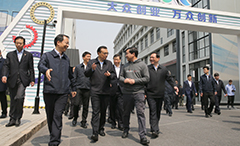Centers to enhance the use of innovation resources
2018-08-25
China Daily
China will build a number of State-level industrial innovation centers as part of efforts to ramp up support for high-tech sectors in line with the nation’s innovation strategies.
A key focus of launching the innovation centers will be “promoting the agglomeration of innovative companies and efficient use of innovation resources”, said Wu Hao, a senior official with the National Development and Reform Commission, on Aug 24.
Beijing, Shanghai and the Guangdong-Hong Kong-Macao Greater Bay Area will become world-class science and technology innovation hubs, he said.
Efforts will include improving construction of technology infrastructure to support development of cutting-edge research platforms and improving policy support to channel more funds to encourage innovation of market players, according to Wu.
The United States has long blocked exports of high-tech products to China, which is seen as a move partly aimed at limiting China’s technology development capabilities. It recently has levied hefty tariffs on imports from China and threatened to block high-tech merger and acquisition deals involving Chinese companies in the US.
“The tariffs (of the US) will have an impact on high-tech industries in both countries and even on a global scale,” Wu said. But “the fundamentals of China’s fast-growing new emerging sectors remain sound and have not changed”, Wu said, responding to queries of the possible impact of the tariffs by the United States on $50 billion in Chinese goods including high-tech products.
Ren Zhiwu, head of the commission’s high-tech industry department, said the sector has achieved stable growth overall.
In the first seven months of the year, the output of high-tech manufacturing industries increased by 11.6 percent year-on-year, which is 5 percentage points higher than overall industrial output, according to data from the commission.
State-level innovation centers have already been established to tackle bottlenecks that limit development of key industries, such as semiconductors, smart sensors and 3D printing.
The national robotics innovation center, for instance, was founded last year to develop crucial components for which China now relies on imports.
Miao Wei, minister of industry and information technology, said earlier this year that more efforts are needed to cultivate national innovation centers as an efficient way to cultivate homegrown core technologies.


